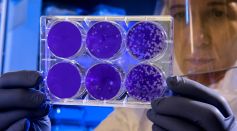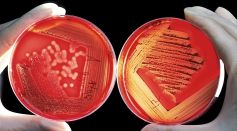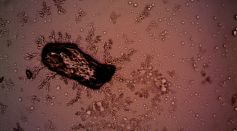Tags: Antibiotics

Fast-melting Glaciers Could Release Hundreds of Thousands of Tons of Bacteria Into Rivers, Study Reveals

Triple-Acting Antibiotic Agent: Efficacy in Effectively Killing Bacteria Revealed in New Study

Antibiotics Taken During Infancy May Affect a Person’s Gut Health in Adulthood

5 Health Myths Debunked: Cleaning Ears Often With Cotton Buds, Drinking 8 Glasses of Water Daily, and More
Boron Nitride Nanoparticles Possible 100% Potential As Substitute for Antibiotics, Surgery, Implantology, Traumatology
'Parasite' Slithers Out From Woman's Eyelid; People Says It's Botfly

Dogs Fed With Raw Meat Have Antibiotic-Resistant E.coli and Other Bacteria That May Be Passed to Humans

New Compound Found in Marine Sponge Can Solve Antimicrobial Resistance Problem
Typhoid Fever Resistance to Antibiotics Is Growing and Spreading, Scientists Warn

Antimicrobial Resistance: New Study Discovers That Bacteria Connect to Exchange DNA and Fight Antibiotics Making Curable Illness Fatal

Nanoparticle-Based Treatment for Sepsis Tested in Mice to Help Prevent Multiorgan Injury

20 New Species of Bacteria With Antibiotic-Resistant Genes and May Promote Emergence of Infectious Diseases Discovered in Antarctica

New Antibiotic Potentially Effective in Treating Human Diseases by Neutralizing Drug-Resistant Bacteria

Hospitalization During COVID-19 Pandemic in US Linked to Antimicrobial Resistance Increase

Are Nanoparticles Replacing Antibiotics? Plants May Be Used As Drug Alternative

tRNA Molecule, MiaA Bacterial Enzyme May Soon Help Patients Get Rid of Persistent Bad Infections, New Study Reveals

Antibiotic Overprescription: Early Antibacterial Treatment Could Decrease Newborns' Gut Microbiome, Increase Antimicrobial Resistance

Nanoantibiotic Technology Developed to Eliminate Bacteria While Keeping Body Cells Untouched

Bacteria on Hedgehog Developed Antibiotic Resistance in Response to Natural Skin Fungus

Surface Properties of Spider Silk Examined; Research Reveals Web as Potential Material for Surgery and Food Packaging
Most Popular

Ancient Hotspot Found to Have Created Great Lakes 300 Million Years Ago

Mysterious Structures Discovered Beneath the Pacific Ocean, Puzzle Scientists

Health Benefits of Drinking Hot Chocolate

Largest Known Volcanic Aquifer Discovered Beneath Oregon's Cascades





